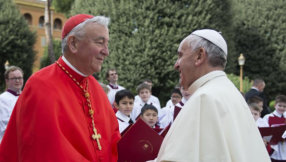Bible Society Review: It's Friday, but Sunday's coming
The message is simple: whatever happened on Good Friday, no matter how bleak it might seem, Christ's resurrection brings to the world the most amazing hope.
Watching the third part of The Passion, seeing a dramatic account and vivid recreation, where much of the violence and pain is graphically filled in by our imaginations, one had to keep repeating that mantra. It's the only way to help get through the horror unfolding before us.
Trying to review this episode is incredibly difficult. The emotional rollercoaster of the final half-hour overshadows any of the clever-clever, witty banter that could have been said of the first half. The Passion plays out with barely a moment for reflection.
But before Friday comes Thursday. And Thursday gives the disunderstanding of disciples even more to disundertand.
At supper, Jesus appears to hold a parlour game of riddles and intriguing actions that leave the disciples even more confused than they previously were. But Christ's sayings would only make sense by Pentecost.
The Passover tradition includes a family meal together. So naturally, the disciples are doubly confused when Jesus tells them, 'What's special about Passover? I wanted us to enjoy a last meal together. You're my family now. You're all my family.'
Although this is for dramatic purposes, it's still a strange thing for Jesus to say. Likewise, after the foot washing, Peter being warned about betrayal and several other riddles, Jesus tops the lot by breaking bread and sharing the wine in the first communion.
The action then transfers to the foggy, eerie and spooky Garden of Gethsemane, echoing any good horror flick. It here that we hear Christ's prayers - meaty, manly and given earnestly.
And his anger at the disciples is equally strong. We realise that Christ is no pushover, no matter how meek and mild we wish to try and make him.
When Judas is forced to lead the Temple guards to the garden to hand over Jesus, the horror really does stand out. And you can almost feel the testosterone in the air as the sword fight is played out in big, confusing terms, just as it probably was.
The events are so believable. The confusion in the air is palpable and, as people in Jerusalem wonder where it's all going, we already know. This shows the drama's strength. We are completely drawn in to the action, and care as all the strands are woven closely together.
For example, we share in Caiaphas' frustrations as he attempts to keep the peace. We believe him when he says he would let Jesus go if he renounced his teachings. But, Jesus doesn't. And as Jesus remains silent, somehow he is majestic.
We are so familiar with the events that happen next... the crowd let Barrabas off and send Jesus to his death. Thankfully this scene is played not as something out of Monty Python, but as a mucky, dirty and rough piece of justice. We feel for Christ as he is sent to his unfair death.
And from this point on, it's impossible to have a sense of detachment from the drama.
Thank goodness it's Friday and Sunday's coming.
Christ's brutal suffering is wisely left to our imagination. Thankfully seeing the after-effects are enough to make us appreciate it - Mel Gibson take note.
As Christ makes his way towards Calvary, we see palm fronds litter the streets. To hammer the point home, Christ has a flashback to his triumphant entry just a few days before.
And then comes the cross. With big, fat, heavy, brutal and violent nails hammered home, Christ is hoisted up to meet his death. As his mother runs up wailing in disbelief, the direction is simply perfect. We share in the sorrow.
To speed up his death, Roman soldiers break Jesus' legs - a brutal act but one that is meant as an act of kindness.
And then, with a cry of 'Eli, Eli, lama sabach thani' - 'My God, my God, why have you forsaken me?' - his eyes close. His head hangs. The credits roll.
There can be no doubt that Christ is dead and we are left to ponder for a few brief moments on what we have just seen - or until the continuity bloke interrupts a necessary silence to tell us that the news.
It's Friday. But Sunday's coming.
Bible Society has produced a range of resource to accompany The Passion, which can be downloaded from biblesociety.org.uk. They include materials for use in schools and church groups.
Phil Creighton is TV critic of The Baptist Times and author of How To Be Heard In A Noisy World - Church Publicity Made Easy. This review was written on behalf of Bible Society













